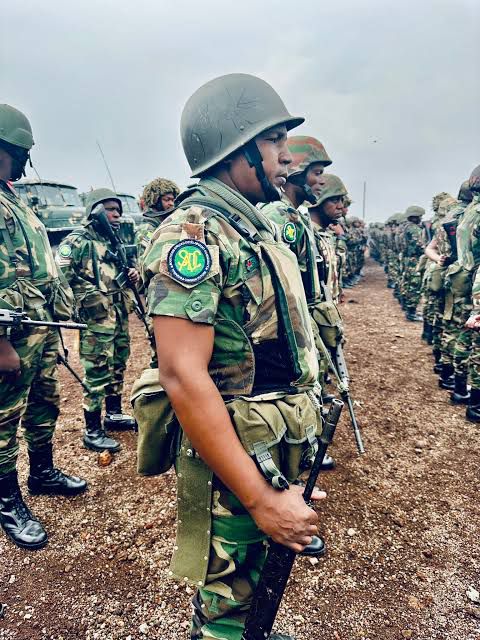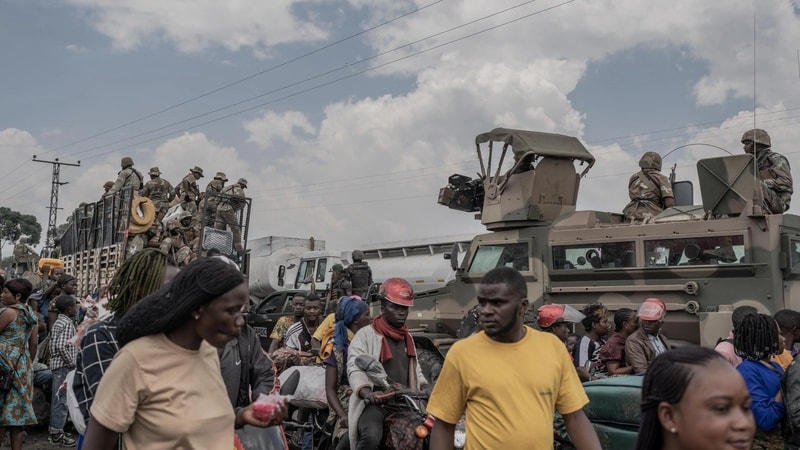
By Raphael Wanjala
SADC ; The Southern African Development Community has announced the phased withdrawal of its military forces from the Democratic Republic of Congo (DRC), signalling a shift in regional efforts to address the ongoing conflict in the eastern part of the country. The decision comes amid escalating violence involving the M23 rebel group, raising questions about the effectiveness of military intervention in stabilizing the region.
The SADC Mission in the DRC (SAMIDRC) was deployed in December 2023, with troops from South Africa, Tanzania, and Malawi. The primary goal was to support the DRC’s national army in combating armed insurgencies that have plagued the eastern provinces for decades. The mission sought to reinforce security in the region, particularly against the M23 rebel group, which has intensified its attacks, seizing key territories and displacing thousands of civilians.
Despite initial successes in securing some areas, the mission faced major operational and logistical challenges. Over the past year, SAMIDRC has suffered heavy casualties, with reports of ambushes and clashes with well-equipped rebel forces. “Our troops have faced immense difficulties, including navigating difficult terrain and engaging a highly mobile enemy,” said a senior SADC military official, speaking on condition of anonymity. “The losses have been substantial, and it became clear that a military solution alone would not bring lasting peace.”
During an extraordinary virtual summit held on March 13, 2025, SADC leaders, including South African President Cyril Ramaphosa and Tanzanian President Samia Suluhu Hassan, agreed to terminate the mandate of SAMIDRC. The leaders acknowledged the need for a gradual withdrawal to prevent further destabilization while ensuring the safety of the deployed troops.
“The decision to withdraw our forces does not mean abandoning the people of the DRC,” said President Ramaphosa. “We remain committed to supporting diplomatic efforts that will bring lasting peace to the region.”
The phased withdrawal will begin immediately, with a full exit expected within the next six months. This timeline is designed to allow for a smooth transition and avoid creating a security vacuum that armed groups could exploit.
The decision to withdraw comes at a time of increasing violence in the eastern DRC. The M23 rebel group, which has been fighting government forces for years, recently captured strategic towns.
M23 has seized swaths of the mineral-rich and volatile eastern DRC, including the key cities of Goma and Bukavu, in a lightning advance since January.
The Congolese government says at least 7,000 people have died since then.
“The humanitarian situation is worsening by the day,” said UNHCR representative Martin Mulongo. “Over two million people are displaced, and our resources are stretched thin. The withdrawal of SADC troops adds another layer of uncertainty to an already dire crisis.”
Refugee camps are overcrowded, with limited access to food, clean water, and medical care. Human rights organizations have also reported increased cases of gender-based violence and forced recruitment of child soldiers by armed groups.
SADC’s decision to withdraw has sparked mixed reactions. Some analysts argue that the military intervention was necessary to curb the growing influence of rebel groups, while others contend that it was never a sustainable solution to the crisis.
The DRC government, led by President Félix Tshisekedi, has expressed concerns about the withdrawal but remains open to alternative peace-building measures.
Officials in Kinshasa are now considering engaging in direct negotiations with M23 leaders, a move that could pave the way for a political resolution to the conflict. The Angolan government has offered to mediate these talks, providing a diplomatic platform for discussions.
Meanwhile, international stakeholders, including the African Union (AU) and the United Nations, have urged all parties to prioritize peace efforts. UN Secretary-General António Guterres has called for increased humanitarian assistance to support displaced populations and prevent further suffering. “The people of the DRC deserve peace and stability,” Guterres said in a statement. “All parties must commit to constructive dialogue and sustainable solutions.”
The withdrawal of SADC troops raises important questions about the future of peacekeeping efforts in the region. Military interventions have historically faced difficulties in the DRC due to the complex nature of the conflict, which involves multiple armed groups, ethnic tensions, and foreign influence.
Moving forward, experts suggest that a multi-faceted approach is needed—one that includes diplomatic negotiations, economic development, and stronger governance structures. The DRC’s vast mineral wealth, including deposits of cobalt and gold, has long been a driver of conflict, with armed groups vying for control over lucrative mining areas. Addressing the root causes of the crisis will require transparent resource management and economic opportunities for local communities.
SADC has pledged to continue supporting the DRC through non-military means, including capacity-building programs for security forces, investment in infrastructure, and diplomatic mediation. South Africa has already announced plans to deploy political advisors to assist the DRC government in negotiating peace agreements with rebel factions.
The decision to withdraw SADC troops from the DRC marks a turning point in regional peacekeeping efforts. While the mission was intended to provide stability, the realities on the ground have underscored the challenges of using military force as a long-term solution. As SADC shifts its focus towards diplomacy and humanitarian assistance, the hope is that a sustainable peace agreement can be reached through dialogue and regional cooperation.
For the people of the eastern DRC, the road ahead remains uncertain. Whether the withdrawal will lead to renewed violence or a chance for lasting peace will depend on the commitment of all stakeholders to finding a political resolution to one of Africa’s longest-running conflicts.
